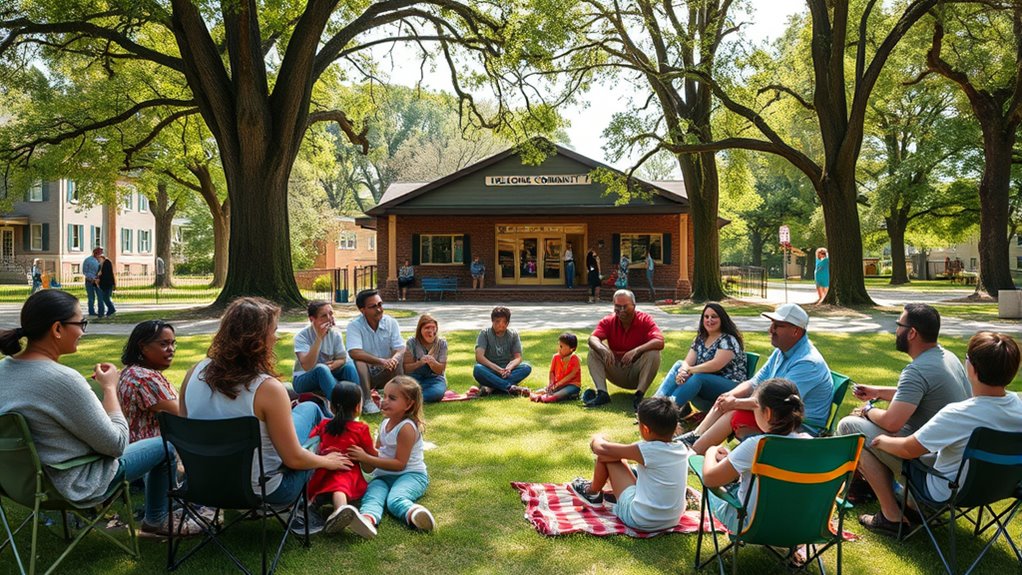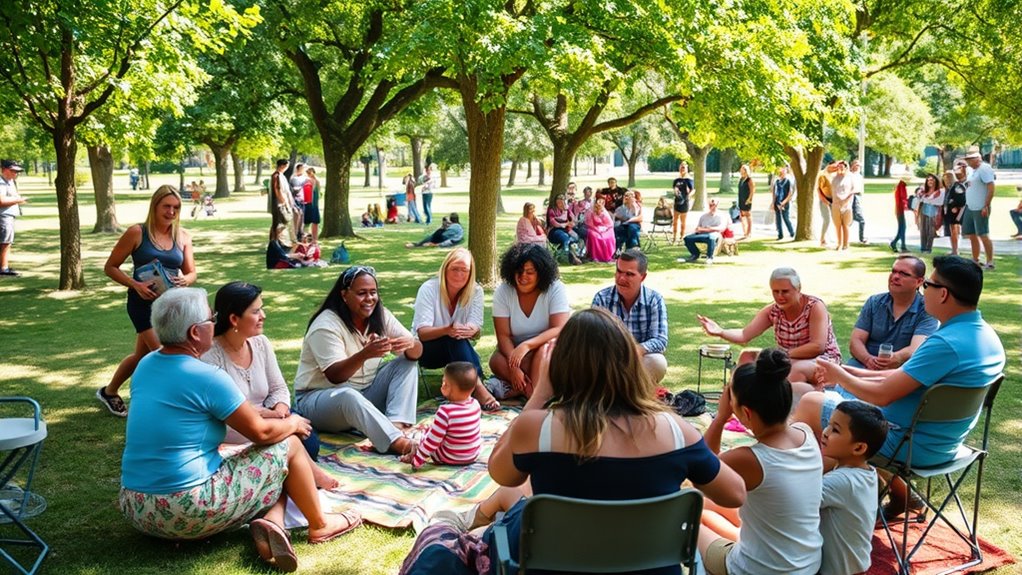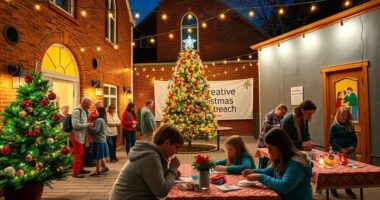Building community through small group outreach involves intentionally creating spaces for genuine connection, spiritual growth, and mutual support. By fostering authentic relationships through shared experiences, prayer, and service projects, you strengthen bonds and build trust. Active engagement and open communication encourage members to participate fully and deepen their faith together. When outreach is strategic and consistent, it enhances community resilience and purpose. If you explore further, you’ll discover more ways to cultivate a thriving, supportive group that truly makes an impact.
Key Takeaways
- Foster intentional, small gatherings to deepen connections and build trust among community members.
- Incorporate outreach activities within small groups to extend community impact and invite new members.
- Encourage active participation through prayer, discussion, and service to strengthen bonds and spiritual growth.
- Use consistent communication and strategic planning to sustain engagement and promote a welcoming environment.
- Create a supportive space where members can share experiences, celebrate victories, and support each other through challenges.

Building community often begins with small, intentional gatherings where people can connect on a deeper level. When you create opportunities for genuine interaction, you lay the foundation for trust and belonging. Small groups foster an environment where members can share their experiences, struggles, and victories, which strengthens bonds and nurtures a sense of camaraderie. These gatherings serve as a essential space for fellowship opportunities, allowing individuals to forge meaningful relationships beyond surface-level interactions. As you invite others to join, remember that consistent presence and openness are key. Over time, these connections develop into a supportive network that becomes a source of encouragement and accountability.
Building community begins with intentional, genuine connections fostering trust, belonging, and lasting relationships.
Fellowship opportunities within small groups are more than just social events—they are indispensable for spiritual growth. When you gather intentionally with others who share your faith, you open the door for collective prayer, biblical discussion, and shared reflection. These activities deepen your understanding of spiritual principles and help you apply them in everyday life. As you participate actively, you’ll find that spiritual growth is accelerated by the accountability and encouragement of others who are on the same journey. Small groups create a safe space to ask questions, voice doubts, and celebrate spiritual milestones, all of which contribute to a stronger, more resilient faith.
You play a key role in fostering an environment where everyone feels valued and heard. By actively listening and showing genuine interest, you help cultivate a sense of belonging that motivates members to stay committed. Small groups thrive on participation, so your engagement in discussions, prayer, and service opportunities can inspire others to deepen their own spiritual journeys. When you prioritize authentic relationships, you’re not just building a group—you’re nurturing a community rooted in shared faith and mutual support.
Additionally, small groups can serve as a launching pad for outreach and service projects that extend your community’s reach beyond its walls. These efforts not only bless others but also reinforce the bonds within your group. As you work together to make a difference, you’ll find that your collective sense of purpose and connection grows stronger. Incorporating effective tuning techniques such as consistent communication and strategic planning can enhance your outreach efforts even further. Building community through small group outreach isn’t just about gathering; it’s about creating a dynamic, supportive environment where spiritual growth flourishes and fellowship opportunities abound. When you invest intentionally in these relationships, you set the stage for a vibrant, resilient community that can weather challenges and celebrate victories together.
Frequently Asked Questions
How Do I Recruit New Members for Small Groups Effectively?
You can recruit new members for small groups effectively by leveraging social media to share engaging posts and stories that highlight group benefits. Personal invitations are also powerful; reach out directly to friends or acquaintances, inviting them warmly and sincerely. Combine these strategies by posting inviting messages online and personally inviting people you know, making it clear how they’ll grow and connect through your small group.
What Activities Foster Stronger Bonds Within Small Groups?
Think of your small group as a garden that needs nurturing. Icebreaker games break down walls like a gentle breeze, encouraging openness. Shared meals serve as the sunshine, fostering connection and trust. To strengthen bonds, organize fun activities that promote teamwork and vulnerability. These small acts, like watering your garden, help your group grow closer, creating a thriving community where everyone feels valued and understood.
How Can I Handle Conflicts Within a Small Group?
When conflicts arise, you should focus on conflict resolution by encouraging open dialogue and practicing active listening. Make sure everyone feels heard and understood, which helps defuse tension. Address issues calmly and privately if needed, and aim for solutions that respect everyone’s perspectives. By fostering a safe space for honest communication, you create stronger bonds and help your group grow closer through mutual understanding and respect.
What Is the Ideal Size for a Small Outreach Group?
You might think bigger is better, but the ideal outreach group size is around 8 to 12 members. Smaller groups foster better group dynamics and promote meaningful connections, which enhances leadership development. Ironically, trying to include everyone can impede progress. By keeping it intimate, you ensure active participation, trust, and growth—key ingredients for building a strong, engaged community that thrives on genuine relationships.
How Do I Measure the Success of Community Outreach Efforts?
You measure the success of your community outreach efforts by tracking participation metrics and evaluating community engagement. Look at how many people attend events, join groups, or volunteer, and note their ongoing involvement. Pay attention to feedback and conversations that show genuine connection. If participation increases and your community feels more connected, you’re on the right track. Regularly review these metrics to refine your outreach and boost impact.
Conclusion
By engaging in small group outreach, you create a strong foundation where everyone feels they belong. Your efforts foster genuine connections, turning strangers into friends and community into family. Remember, the journey of building community isn’t a sprint—it’s a marathon. So keep showing up, reaching out, and investing in others. When you plant seeds of kindness and understanding, you’ll find that the whole community blossoms in ways you never imagined.










